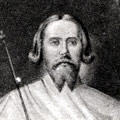Owain Glyndŵr
 Owain Glyndŵr (c.1349-c.1416) was the leader of a Welsh revolt against English rule between 1400 and 1409. Years of attempts to subordinate the Welsh to the English crown and harsh rule had created a climate ripe for popular revolt. Owain Glyndŵr was well placed to lead this rebellion. He was charismatic and directly descended from Welsh aristocracy and royalty.
Owain Glyndŵr (c.1349-c.1416) was the leader of a Welsh revolt against English rule between 1400 and 1409. Years of attempts to subordinate the Welsh to the English crown and harsh rule had created a climate ripe for popular revolt. Owain Glyndŵr was well placed to lead this rebellion. He was charismatic and directly descended from Welsh aristocracy and royalty.
Owain Glyndŵr's dispute with his neighbour Lord Grey of Ruthin, a close ally of Henry IV, sparked the revolt. After Owain Glyndŵr’s attack on Ruthin and other towns in north Wales Henry led an army into Wales and Glyndŵr’s lands were confiscated. Owain Glyndŵr and his forces embarked on a successful campaign of guerrilla warfare which developed into conventional battles. As he started to score ever more impressive victories Owain Glyndŵr’s fame spread throughout Wales. He drew increasing support from the Welsh eager to throw off the yoke of English rule.
Such was his success that by 1403 the forces of Owain Glyndŵr controlled a major part of Wales. In 1404 he captured the significantly important castles of Aberystwyth, Criccieth and Harlech. Owain Glyndŵr was crowned as Prince of Wales when the first Welsh Parliament was held at Machynlleth in 1404. He made clear his view of an independent Welsh nation. This was the first of other parliaments held within the next two years. In 1405 he signed a formal treaty with the French who landed troops in west Wales to aid his forces. After 1406 Glyndŵr‘s forces began to experience defeats. There was a gradual rolling back of the ground captured from the English. The severe winter of 1408-9 impacted badly on Welsh communities and added to the problems experienced by the forces of Glyndŵr. His French allies left and in 1409 he lost his power base of Harlech castle. Owain Glyndŵr was never captured and many believe he moved into the Welsh hills. There is no confirmed record of his death.
There is no doubt that Owain Glyndŵr's popular uprising and staggering successes almost achieved Welsh aspirations for independence. This leaves him holding a special place in the hearts of the Welsh people. He remains a national hero and his disappearance into the Welsh countryside, never captured by his enemies, gives rise to an Arthurian type myth. That one day Owain Glyndŵr will again emerge from the mists and clouds of the Welsh mountains and complete the task of securing Wales’s destiny as an independent and sovereign nation.
- Welsh
- English





